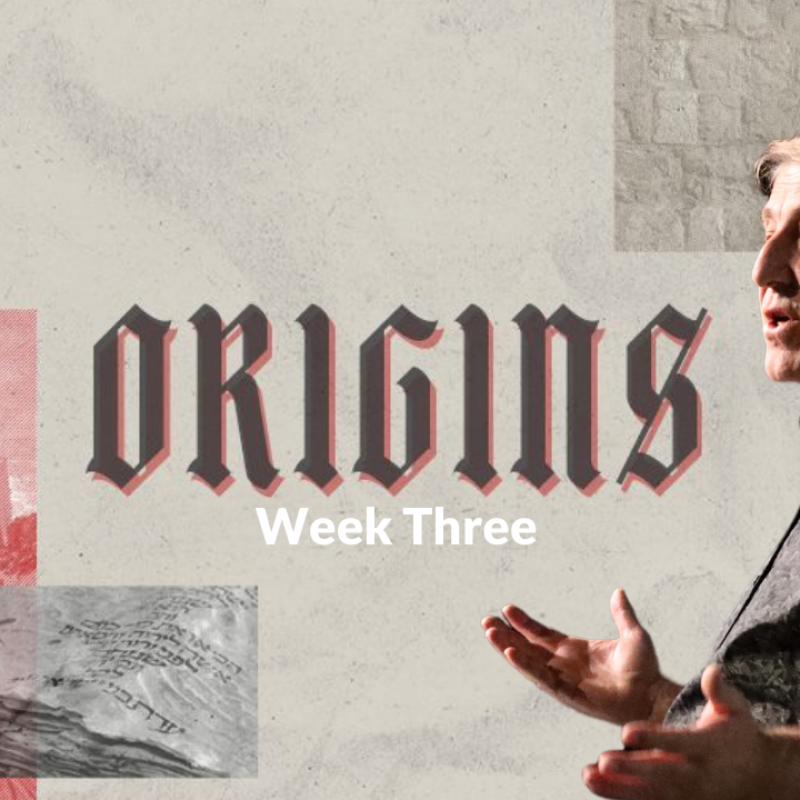Origins: Week 3

Origins: Week 3
Did You Know?
- In the New Testament the word serve and the word minister are translated from the same Greek word, διακονία pronounced dee-ak-on-ee’-ah. This is also where the title Deacon comes from.
- In Acts 6 the Greek word for minister is also translated as distribution of food (NIV) or the serving of food (AMP).
- In Luke 22:26 Jesus said that the greatest among us will be a diakonōn translated as a server.
- Calling a minister “reverend” did not originate in scripture. The term became accepted sometime in the seventeenth century in England as a scriptural show of respect toward men of God.
- Biblically, everyone who serves faithfully in the church is considered a minister.
To return to God’s original design of His church includes serving others.Why should you serve? Here are examples from the Original that tell us why.
Example #1 – Jesus demonstrated that God’s personality is service.
Matthew 11:29 (ESV) — Take my yoke upon you, and learn from me, for I am gentle and lowly in heart, and you will find rest for your souls.
John 13:1-5 (ESV)
Matthew 20:25-28 (ESV) — But Jesus called them to him and said, “You know that the rulers of the Gentiles lord it over them, and their great ones exercise authority over them. It shall not be so among you. But whoever would be great among you must be your servant, and whoever would be first among you must be your slave, even as the Son of Man came not to be served but to serve, and to give his life as a ransom for many.”
Question: What is serving in the church supposed to do? Is serving supposed to get stuff done or something else?
Example #2 – The events described in Acts 6 demonstrate that it is primarily serving that supports a church moving forward in its mission.
Acts 6:7 (ESV) — And the word of God continued to increase, and the number of the disciples multiplied greatly in Jerusalem, and a great many of the priests became obedient to the faith.
Acts 6:1-6 (ESV)
Example #3 – Acts 9 demonstrates how serving impacts others with the Gospel.
Acts 9:36-39 (ESV) — Now there was in Joppa a disciple named Tabitha, which, translated, means Dorcas. She was full of good works and acts of charity. In those days she became ill and died, and when they had washed her, they laid her in an upper room. Since Lydda was near Joppa, the disciples, hearing that Peter was there, sent two men to him, urging him, “Please come to us without delay.” So Peter rose and went with them. And when he arrived, they took him to the upper room. All the widows stood beside him weeping and showing tunics and other garments that Dorcas made while she was with them.
The Most Lethal Myths That Kill Ministry
- You cannot serve in a ministry where you do not have a say in how things are run.
- The needs in the church are so great that it is just overwhelming so why even try.
- You have to find a ministry where your spiritual gift can be best expressed.
Questions to Consider:
Please start by reading through Acts 9:36-42 and considering the following questions. It might be helpful to read it in more than one version of the New Testament.
- What did the people who lived in Joppa want Peter to do for them?
- What had Dorcas done that caused people to be so concerned about her dying?
- Have you ever known anyone who affected others like Dorcas had impacted these people in Joppa? If so, what were they like? What made them special?
- How do you think Dorcas’ lifestyle of serving others had advanced the message about Jesus to the community?
- Sometimes we look at a person in the Bible and think or feel that it is not for us to change anything about our approach to life. Is there anything from the three examples that were given in this sermon that give you an idea of something small that you could change? If so, what would that be?
- Can you be part of the 26 for three months?
For Small Group Discussion:
Opening Question: When was a time when someone ministered to you? Have you ever had someone not give up on you?
Main Point: Ministering to others is an important part of growing as a disciple of Jesus. Read/Tell the Story: Mark 2:1-12 (Jesus Heals a Paralytic)
Questions:
- What did the men in the story do that the paralytic couldn’t do for himself?
- What do you think motivated these men to take their friend to Jesus? Why didn’t they just give up when they couldn’t get in?
- These men put the needs of the paralytic before their own. What causes someone to put others first?
- How do you think the guy that owned the house felt about this? When has something disrupted your life that was actually for a good cause?
- Jesus forgives the paralytic before healing him. Which do you think is more important?
- Has God (or someone else) ever given you what you needed instead of what you wanted?
- Who do you know that needs help seeing Jesus? What can you do to help them?
- What needs is God asking you to consider, sacrifice for or minister to, in this season?
Supporting Scripture: Ephesians 4:11-16, 1 Peter 4:7-11, Luke 9:1-6
